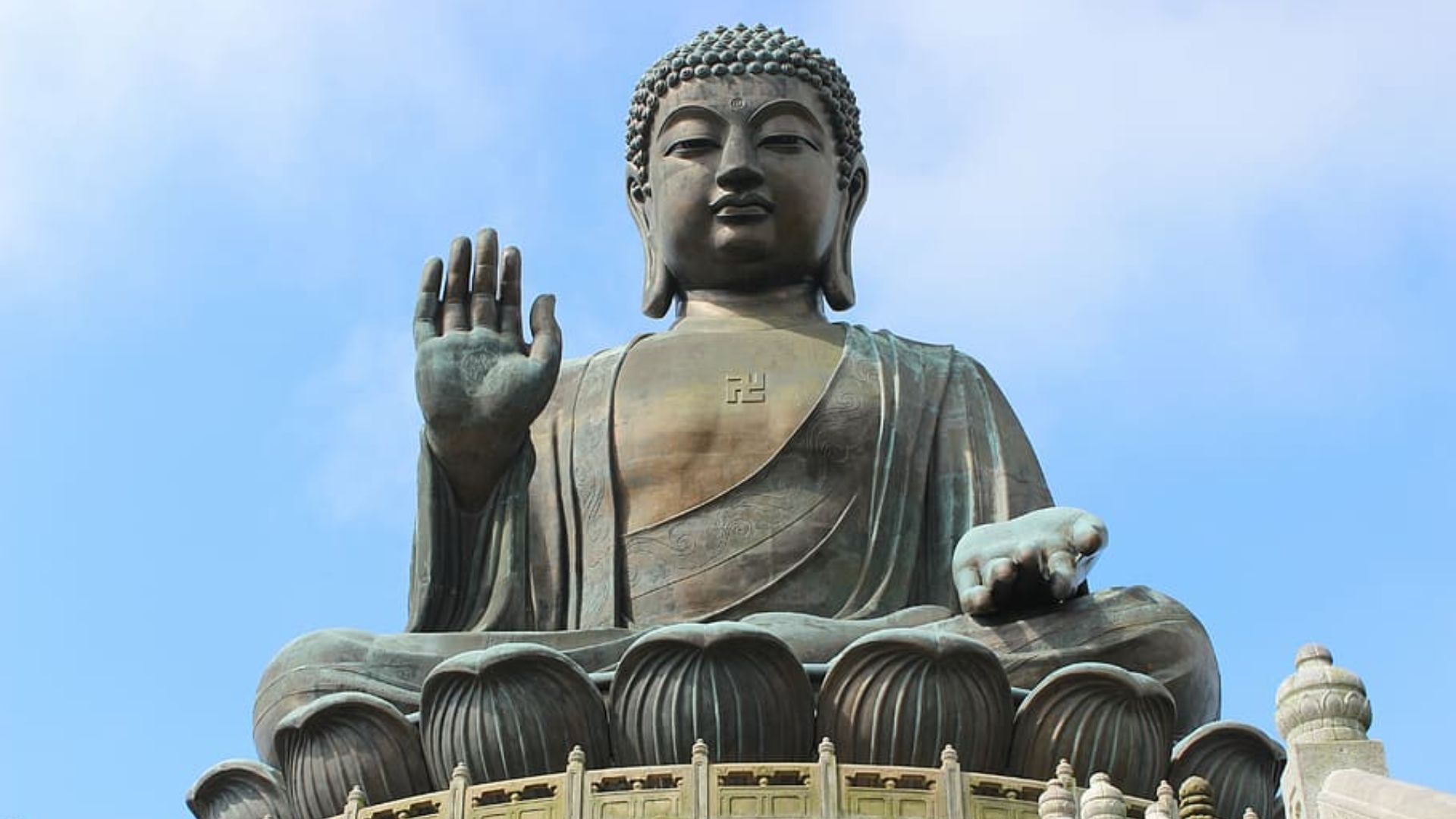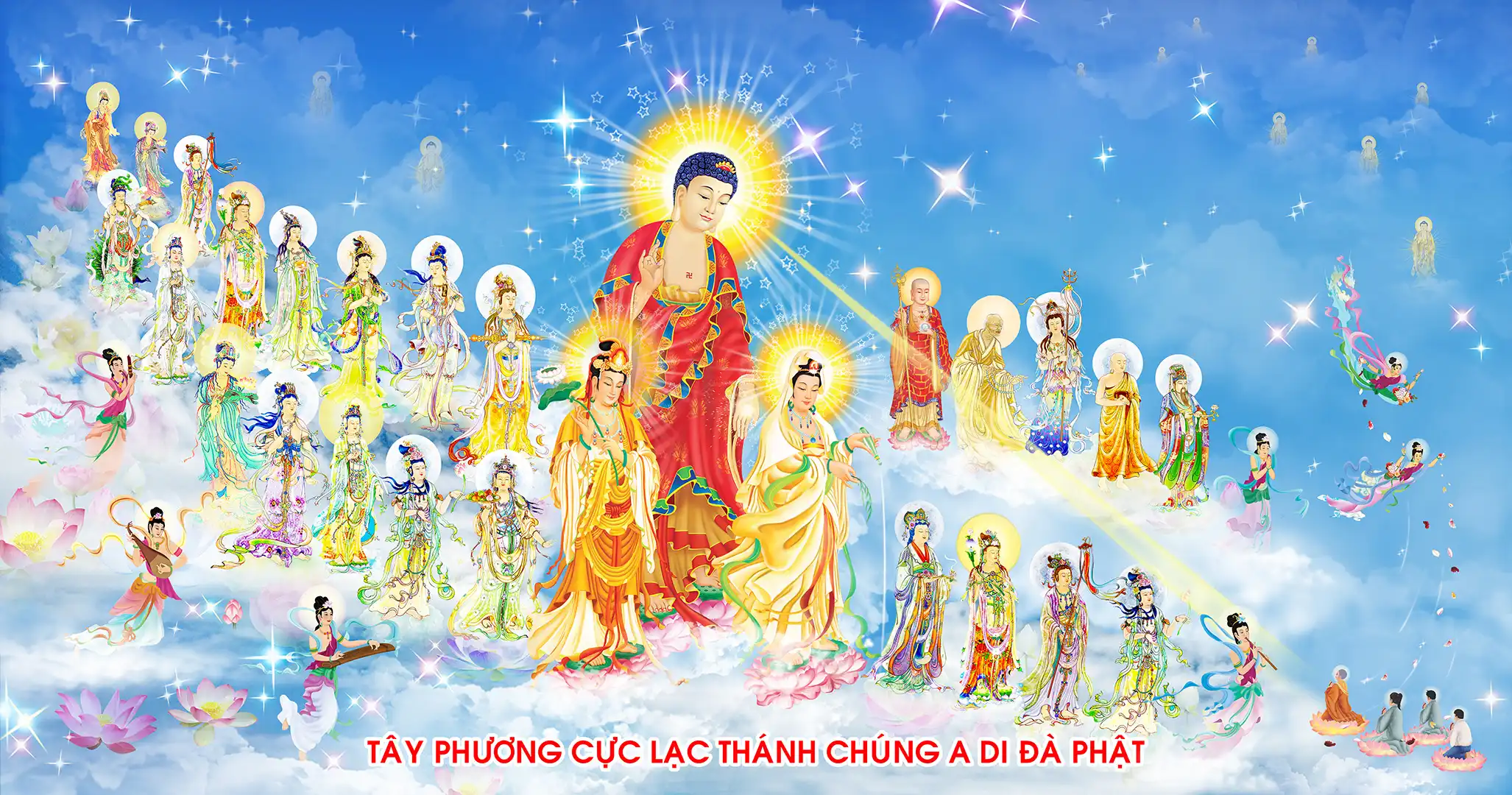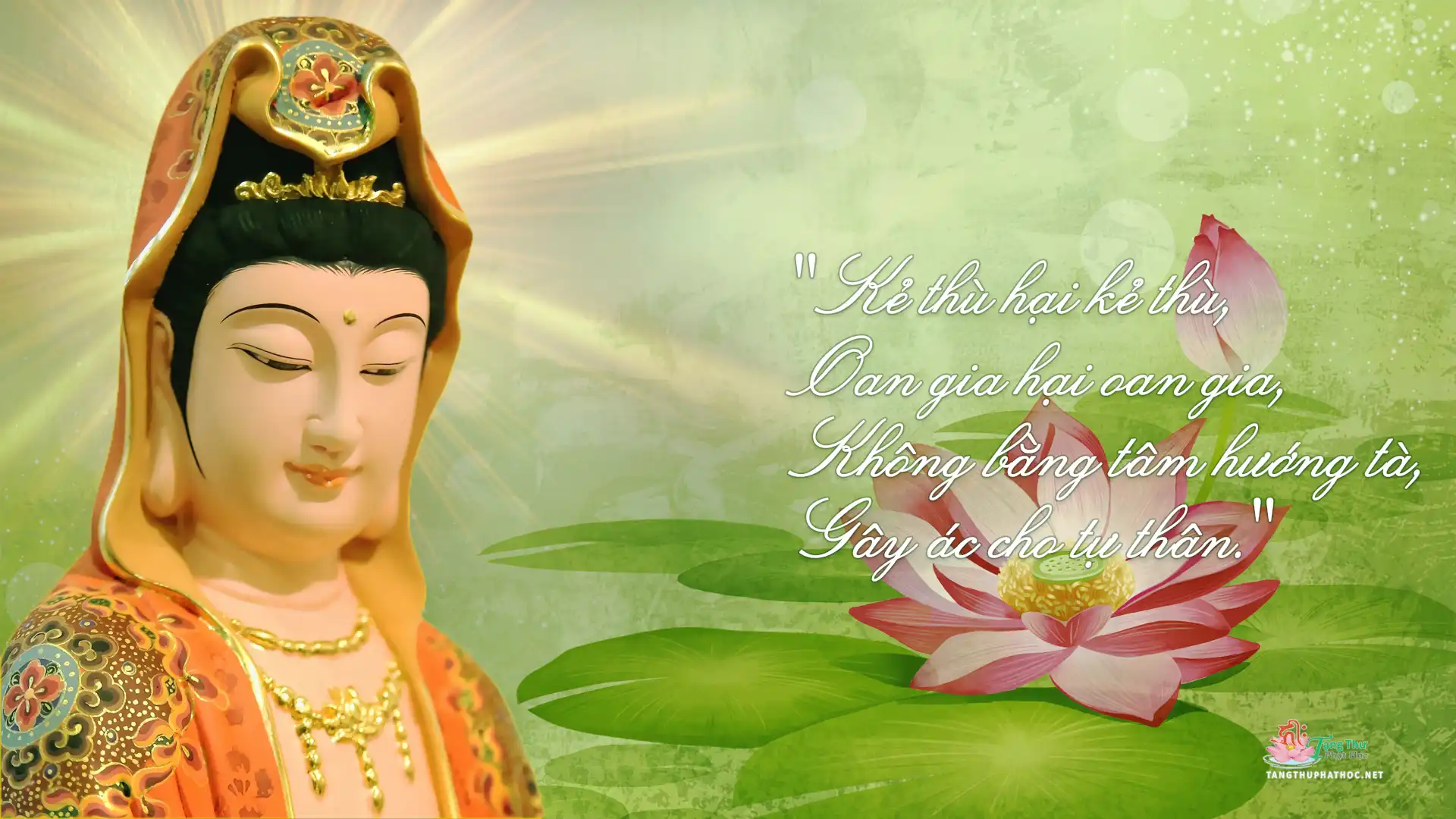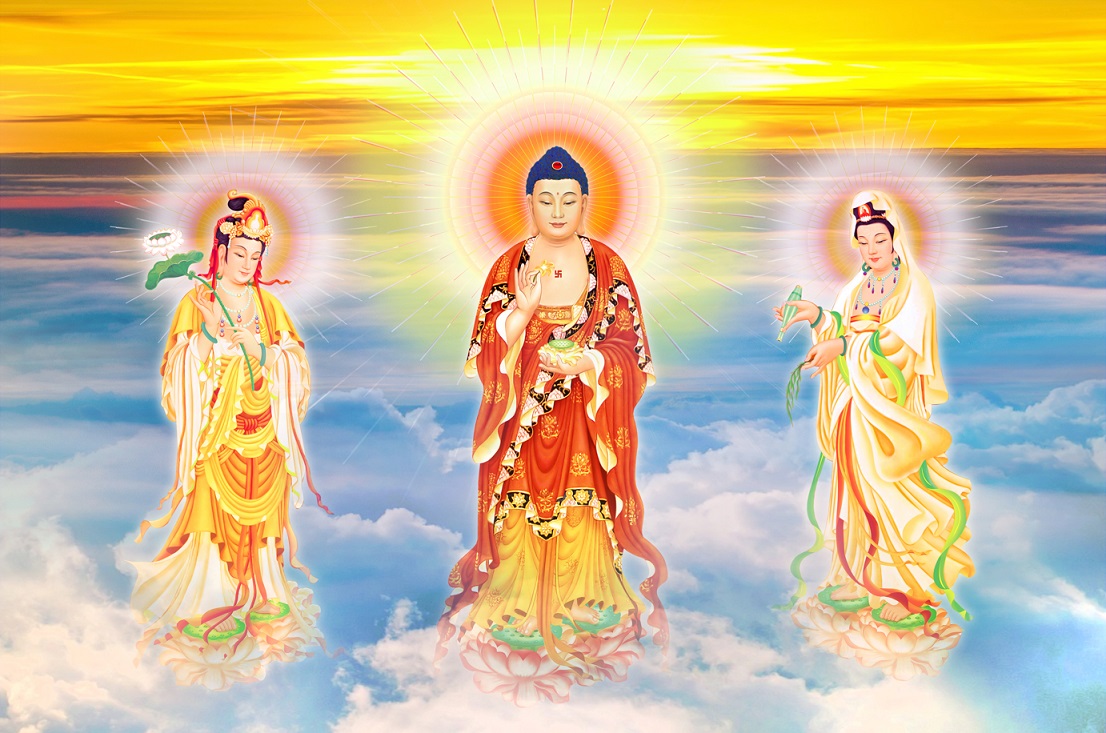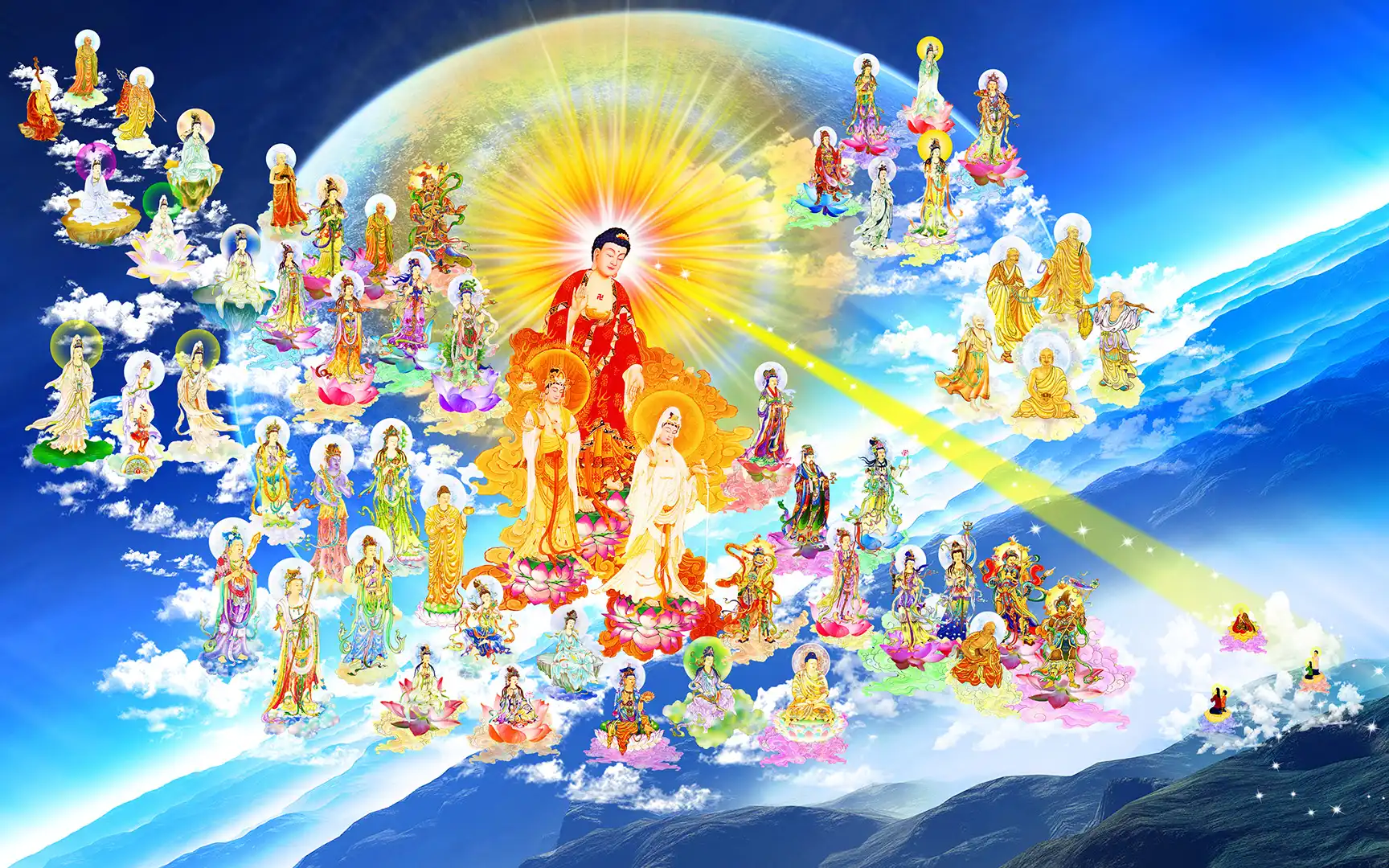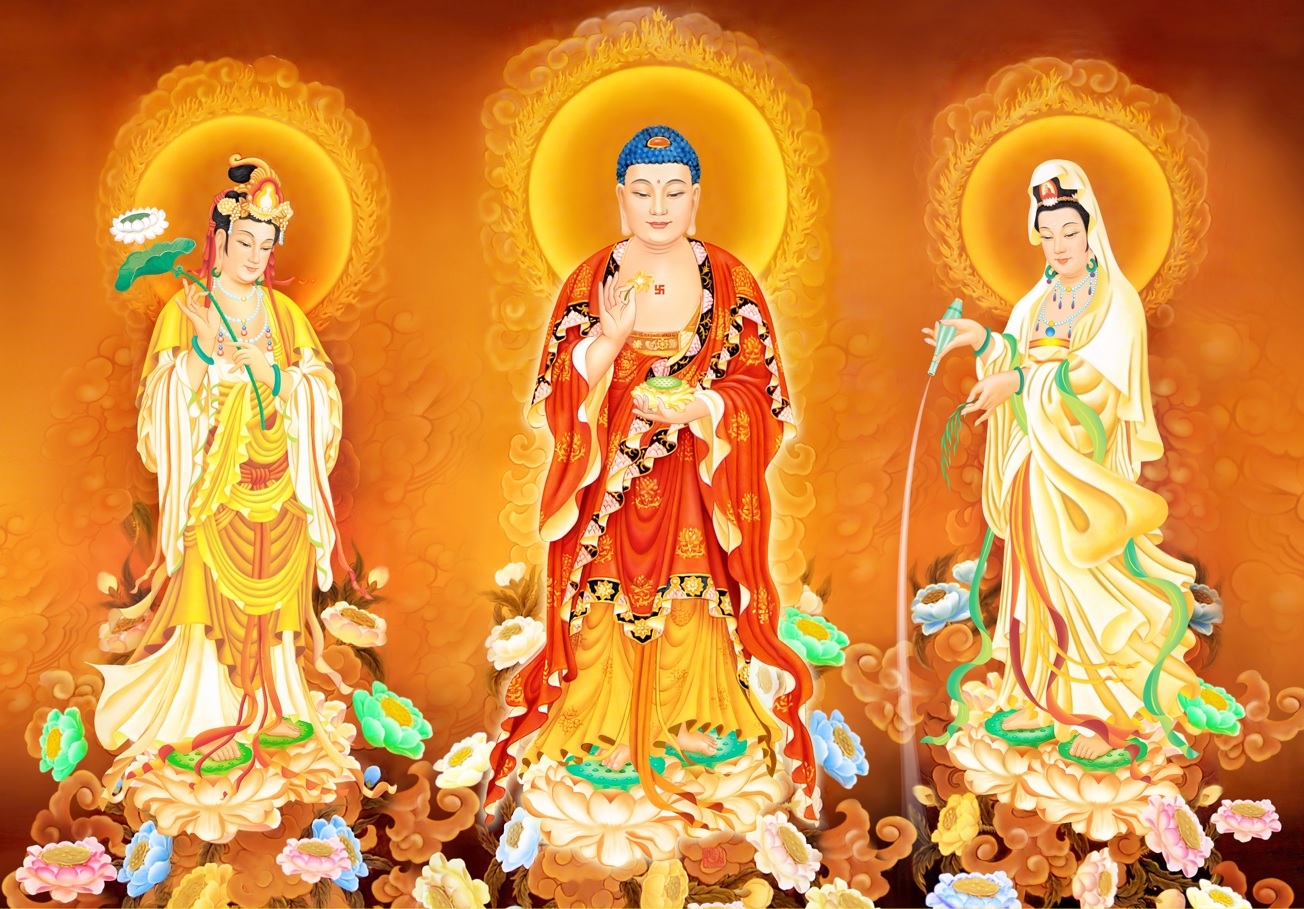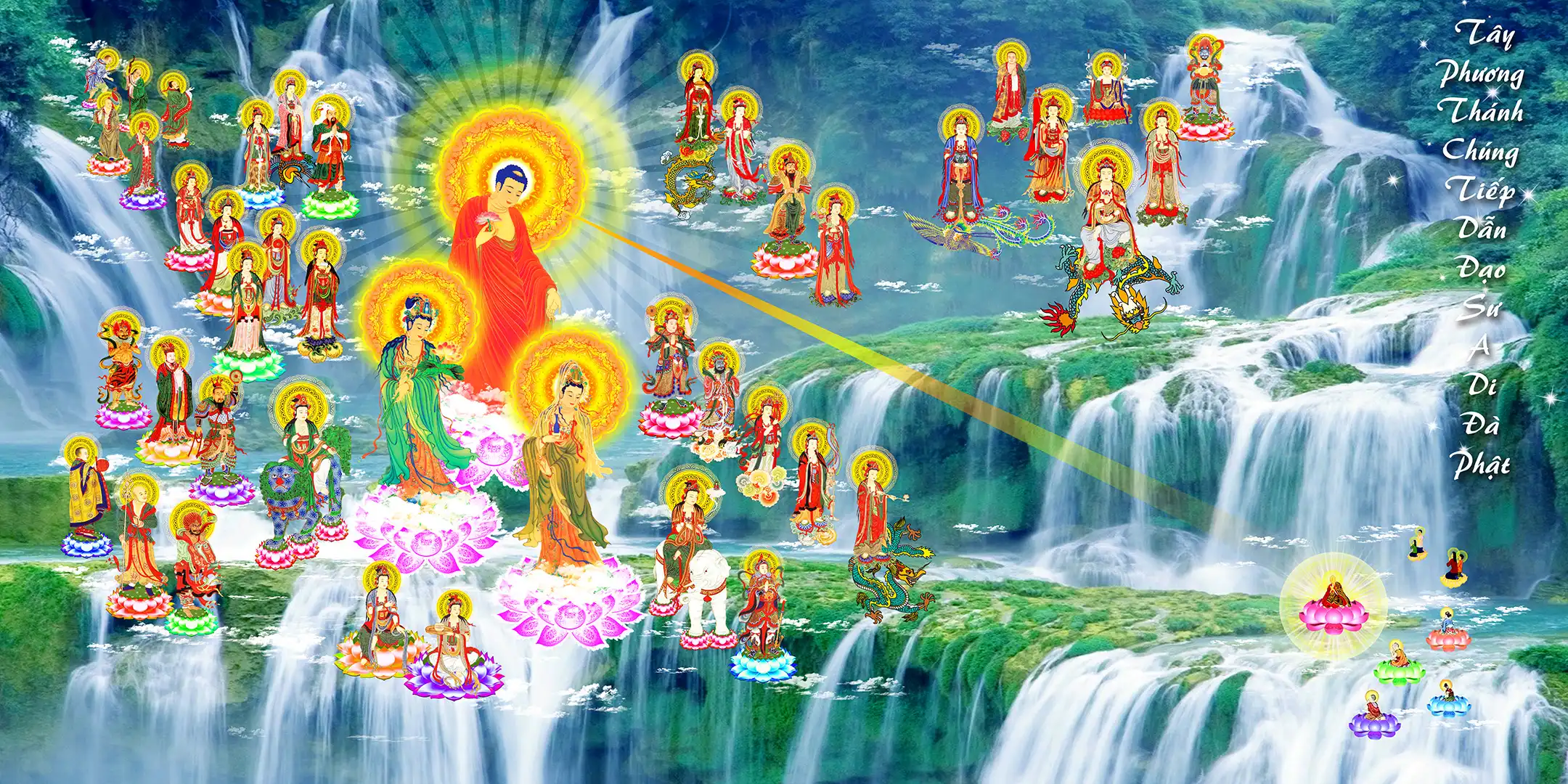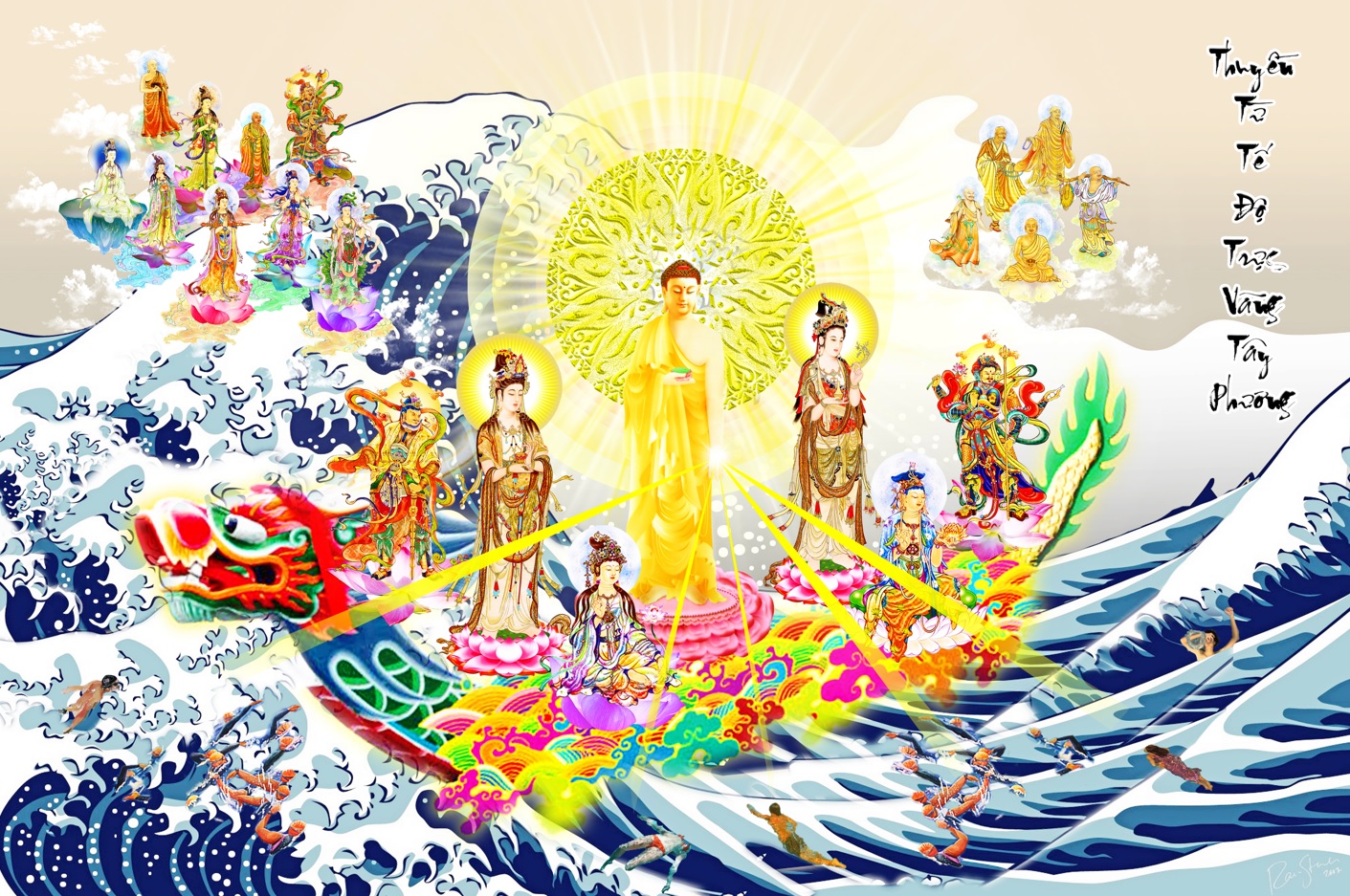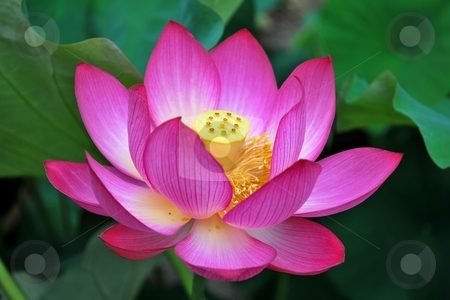SUTRA OF THE PAST VOWS OF EARTH STORE BODHISTSATTVA
A Commentary by the Venerable Master Hsuan Hua
Benefiting the Living and the Dead
Chapter 7
Commentary:
This chapter is beneficial to the living and the dead. How does it help the living? This part of the sutra text makes it clear.
Sutra:
At that time, Earth Store Bodhisattva Mahasattva said to the Buddha, “World Honored One, I see that every single movement or stirring of thought on the part of beings of Jambudvipa is an offense. Beings tend to use up any wholesome benefits they accrue, and many of them end up retreating from their initial resolve. If they encounter evil conditions, they magnify them with every thought. They are like people trying to carry heavy rocks while walking through mud. Each step becomes more difficult and the rocks more cumbersome as their feet sink deeper. If they meet a mentor, he may be strong enough to lighten or even totally remove their burdens. Helping them thus, the mentor will then advise them to stay on solid ground and be mindful never to go back into that treacherous path.
Commentary:
At that time, while the seventh chapter on Benefiting the Living and the Dead is being explained. Earth Store Bodhisattva Mahasattva said to the Buddha, “World Honored One, I see that every single movement or stirring of thought on the part of beings of Jambudvipa is an offense. What do beings of Jambudvipa think about? They think about that which is deviant, that which involves lust, that which they are greedy for, and that which they are selfish about. They are jealous and obstructive. “When someone is better than me, I am jealous.
For example, being jealous of someone more intelligent than me; or when someone is worse than me, I look down on them, thinking they are less than me, which is really stupid.” We do not promote stupid individuals and are jealous of those who are wise. The right thing to do is to teach deluded individuals so that they become wise and intelligent. But people refuse to act this way. This is why every movement or stirring of thought is nothing but an offense. We do not act like Bodhisattvas, who are happy when other people are better than us; we respect them more instead of being jealous. We try to think of ways to make those who are worse than me on par with me; this would be the resolve of Bodhisattvas. Since we did not develop resolves like Bodhisattvas, all these thoughts are offenses.
Beings tend to use up any wholesome benefits they accrue, and many of them end up retreating from their initial resolve. They throw away all their goodness. Perhaps they did some good deeds and wish to plant some good roots, but they do not last too long. They may study the Buddhadharma for a year then quit; study for two years then stop; or retreat when encountering some state.
Initially they made the resolve to study the Buddhadharma or leave the home life; but after leaving the home life for one year, two years, three years, they feel that the monastic life is no big deal. Three years of cultivation and still no enlightenment or certification to the fruition; it is probably hopeless. They retreat and return to lay life. This is for monastics. For lay Buddhists? After studying for a year, the Buddhas are before their eyes and near them; after two years of studying, the Buddhas are as far away as 18,000 miles; after three years of studying, the Buddhas are at the edge of the heavens. Most retreat from their initial resolve.
Therefore it is said, “By not neglecting our initial resolve in cultivation, we have what is more than sufficient to become a Buddha.” If we did not lose our initial thought of studying the Buddhadharma or leaving the home life, then we would have become Buddhas long ago.
Monastics must think, why did we leave the home life? What is the difference between monastics and laity? For instance, laypeople like to talk all day long; whereas monastics should speak less. Monastics may say things that are useful; otherwise, it is best not to talk so much. As it is said, “Our energy scatters when we open our mouth.
Gossip occurs when we move our tongue.” Gossip about right and wrong occurs when we talk a lot. Once there is right and wrong, we do not accord with the Way; when our energy scatters, we do not accord with the Way either. Cultivators must always watch over themselves and not over other people, that would be not retreating from our initial resolve. If we mostly retreat from our initially firm resolve, then we forget our resolve after a while. Many end up retreating from their initial resolves.
If they encounter evil conditions, they increase such conditions with their every thought; they certainly do not retreat from such evil conditions. I encountered many people who cultivated with utmost sincerity, but were affected by demonic states that they encountered. This is about evil conditions. In general, any condition that prevents you from cultivating is an evil condition. They magnify them with every thought. Cultivation requires the gathering of Bodhi resolve that strengthens by the day; resolve that weakens by the day is eventually lost. We usually do not increase our Bodhi resolve by the day; but we develop evil conditions that we encounter by the day.
They are like people trying to carry heavy rocks while walking through mud.This is a simile about people walking into mud, which is not so bad except that they carry a big rock or some load that may be as heavy as 200 pounds. Walking in mud, one of their feet would sink in and by the time one foot gets pulled out, the other foot sinks in so that they cannot walk anymore; they have an extremely difficult time in the mud. One foot out and the other foot is in; the other foot is out and this foot sinks in. They may still walk if they did not have anything heavy with them; but they do have an extremely heavy load on them, which is their evil karma. What is mud? It is the three evil paths.
Each step becomes more difficult; the weight of each step increases. And the rocks more cumbersome as their feet sink deeper with each step. What shall they do? If they meet a mentor, he, a Buddha, a Bodhisattva, or an extremely wise teacher may be strong enough to lighten or even totally remove their heavy burdens. Since they cannot proceed with such a load, they need a good teacher who can help them lighten their load, carry half of their load or their entire load. Helping them thus, the powerful mentor will then help them and advise them to stay on solid ground: be careful and take steady steps. And be mindful never to go back into that treacherous path. When they reach level ground, they must reflect and not walk down evil paths of the past. Avoid the mud and dangerous paths.
Sutra:
“World Honored One, the bad habits of beings range from minor to major. Since all beings have such habits, their families or relatives should create blessings for them when they are on the verge of dying in order to assist them on the road ahead. That may be done by hanging banners and canopies; lighting oil lamps; reciting the sacred sutras; and making offerings before the images of Buddhas or sages. Another way to assist them is by reciting the names of Buddhas, Bodhisattvas, and Pratyekabuddhas so that the recitation of each name passes by the ear of the dying one and is heard in his fundamental consciousness.
“Suppose the evil karma created by beings were such that they ought to fall into the bad destinies. If their relatives cultivate wholesome causes on their behalf when they are close to death, then their manifold offenses can be dissolved. If relatives can further do many good deeds during the first forty-nine days after the death of such beings, then the deceased can leave the evil destinies forever, be born as humans and gods, and receive supremely wonderful bliss.
Commentary:
Earth Store Bodhisattva again called out, “World Honored One, the bad habits of all beings range from minor to major, possibly infinite. Since all beings have such habits, their families or relatives should create blessings for them when they are on the verge of dying in order to assist them on the road ahead. At the brink of death, their parents or family should create blessings for them, to help them proceed on to the road ahead, which maybe the hells, the human realm. Regardless of their destiny, they are benefited.
That may be done by hanging banners and canopies; lighting oil lamps before the Buddhas; reciting the sacred sutras such as the EarthStore Sutra, the Vajra Sutra, and other Mahayana sutras. And help them by making offerings before the images of Buddhas, Bodhisattvas, arhats, or sages. Another way to assist them is by reciting the names of Buddhas, Bodhisattvas, and Pratyekabuddhas (those who enlighten to conditions) so that the recitation of each name of the Buddha, Bodhisattva or Pratyekabuddha passes by the ear of the dying one and is heard clearly in his fundamental consciousness. Make him hear it clearly before he passes away and before his consciousness fails.
The fundamental consciousness refers to the Eighth Consciousness, which is the last to leave the body and the first to enter it. One verse goes, “The inexhaustible and vast triple treasury, in the deep pool the waves of the Seventh come blowing like wind before our eyes; permeated with seeds from the senses, the body, and the environment, it is the host who leaves last and enters first.” At the time of [birth and] death, the Eighth Consciousness leaves last and comes first.
The Eighth Consciousness commands our false thinking, making it the host. The fundamental consciousness in the sutra text is referring to the Eighth Consciousness. When all the consciousnesses have dispersed and left: the eye consciousness disappears, the ear consciousness is unable to hear, the nose consciousness, the tongue consciousness, the body consciousness, the mind consciousness all disappear, except for the Eighth Consciousness. Recite the sutras, the Buddha’s name, or create some merit for someone at the point where the Eighth Consciousness has not yet left so fundamental consciousness hears it.
“Suppose the evil karma and offenses created by beings were such that they ought to fall into the bad destinies. Counting up the evil karma they did in their lives and the retribution they deserve, they will definitely fall into the Three Evil Destinies. If their relatives cultivate wholesome causes and do various good deeds on their behalf, on behalf of the dying family member, for instance, when they are close to death, then their manifold offenses as described can be completely and utterly dissolved so that nothing remains.
If relatives can further do many good deeds during the first forty-nine days after the death of such beings, then the deceased can leave the evil destinies forever, be born as humans and gods, and receive supremely wonderful bliss.The seven weeks after death, the deceased is under evaluation in the hells and their offenses have not yet been determined. Were we to do good deeds for such evil beings during that period of time, they will leave the hells, the realm of hungry ghosts, and the realm of animals forever. They will become reborn in the human realm or the heavens and enjoy extremely wondrous happiness.
Sutra:
“Their surviving relatives will also receive limitless benefits. Therefore, before the Buddhas, World Honored Ones, as well as before the gods, dragons, and the rest of the eightfold division, humans and non-humans, I now exhort beings of Jambudvipa to be careful to avoid harming, killing, and doing other unwholesome deeds; to refrain from worshipping ghosts and spirits or making sacrifices to them; and never to call on mountain sprites on the day of death.
“Why is that? Killing, harming, and making sacrifices do not even have a tiny hairbreath of power with which to benefit the deceased. Such acts only bind up the conditions of offenses so that they grow ever deeper and heavier. The deceased might have been due to increase his potential for sagehood or gain birth among humans or gods in his next life or in the future.
“But if his family commits offenses in his name, his good rebirth will be delayed. How much more would that be the case for people on the verge of death who during their lives had failed to plant even a few good roots. Each offender has to undergo the bad destinies according to his own karma. How could anyone bear to have relatives add to that karma? That would be like having a neighbor add s a few more things to a load of over a hundred pounds being carried by someone who had already traveled a long distance and who had not eaten for three days. If that extra weight were added, that person’s burden would become even more unbearable.
Commentary:
“Their surviving relatives will also receive limitless benefits. If family members of the deceased can recite the names of Buddhas, Bodhisattvas, Earth Store Bodhisattva, arhats, Pratyekabuddhas, or any sutra, then not only will the deceased enjoy extremely wondrous joy, but his living family members will also acquire boundless benefits.
Therefore, before the Buddhas, World Honored Ones, as well as before the gods, dragons, and the rest of the eightfold division including yakshas, gandharvas, asuras, garudas, kinnaras, and maharagas, humans and non-humans, out of compassion I now exhort beings of Jambudvipa to be careful to avoid harming, killing, and doing other unwholesome deeds; to refrain from worshipping ghosts and spirits or making sacrifices to them; and never to call on mountain sprites and water monsters on the day of death.
Here is a verse for everyone. The verse goes, “Some confused individuals are not at peace,” which means they do things inappropriately or poorly. “They pray to spirits by sacrificing swine and sheep.” China has a deleterious custom that the West is free of. What is it? The Chinese refer to funerals as white events and marriages as red events; white events are deaths while red events are congratulatory occasions. Whether it is death or marriage, the Chinese will slaughter animals such as chickens and ducks and offer them to ghosts and spirits.
Have you not seen people bring chickens to temples for local city gods? These things are inappropriate and do not accord with the Dharma. They pray before images of gods saying, “Please bless my deceased father or mother, older or younger brother so that he or she does not fall into the hells. After a few days I will kill a pig or a sheep as an offering to you. The swine or sheep is their bet.
“Karma of resentment comes from killing in past lives.” Killing is a type of karma that creates resentment. Having killed in past lives, you kill again in this lifetime. Originally the resentment from killing was created in lives past; but further killing in this lifetime is like adding another layer of frost on top of snow. “Like frost added on prior snow.” The snow earlier was already cold, but now another layer of frost is added on top, so it is even colder. Frost is that which falls before a snowfall.
“Do not mistake swine and sheep for what they are.” Do not be too sure that swine is swine and sheep is sheep. “For a few thousand times they have changed faces.” These pigs and lambs come from people. People can become pigs and pigs can become people. Did you notice? Those in a country who enjoy eating pork look like pigs. Those in a country who enjoy eating beef will have eyes like a cow’s.
In general, people in a certain country will look like whatever they enjoy eating. For instance, the Thais do not like to eat pork or mutton, but they like eating frog meat, which is why the Thais have eyes similar to frogs. People of each country have affinities with a certain species, so we do not know how many times people have changed their faces.
“Like cart wheels that turn and return to repay.” The wheels of a car turn and turn. The Shurangama Sutra says that sheep can become people again. Since sheep can become people, why is it that pigs cannot become people? Not only can sheep and swine become people, any creature can become human by changing the shell of their body. You do not recognize them because they have changed bodies. The spirit moves from a human body to a pig’s body, from a pig’s body to a human body. They exchange houses. This is like us moving from some high-class skyscraper to wooden shacks, the area with the worst housing.
As human beings, it is as if we are living in high risers; but when you become pigs or lambs, it is as if you are living in some small wooden shack, some dilapidated housing. Hence it says, “Like cart wheels that turn and return to repay.” “Seas of clouds soar the sky so that there is nowhere to hide.” Someone who does not understand considers different living beings individual species. Someone who has the power to know past lives know that all beings are connected in this great ocean or space, including places where no one sees.
Imperceptible, seas of clouds soar into the sky so that there is nowhere to hide; no one can hide from cause and effect because they exist forever in space. You reap whatever effects you sow. There will be a consequence for killing. Whatever karma you did, exists, so do not bother praying to ghosts and spirits.
Why is that? Killing, harming, and making sacrifices do not even have a tiny hairbreadth of power with which to benefit the deceased. The swine and sheep you killed and harmed, the evil ghosts and deviant spirits that you worship do not help the deceased a bit. Such acts only bind up the conditions of offenses so that they grow ever deeper and heavier. The deceased might have been due to increase his potential for sagehood or gain birth among humans or gods in his next life or in the future. Someone who in this life or in the next life receives the benefits of your created merit, he or she will become reborn in the human realm or the heavens.
But if his family commits offenses in his name, his good rebirth will benegatively impacted, debated about, and delayed. The deceased will be negatively affected. He goes to the hells to argue with Lord Yama. For instance, Lord Yama says, “On your behalf, your family members slaughtered and offered many pigs to ghosts and spirits.” The deceased will definitely argue, “That is none of my business. I did not tell them to kill. I cannot do anything about their killing.” They hold a debate there. Unfortunately there are no defense attorneys in the hells so they must argue for themselves. They should have been reborn in the heavens quickly but what their families did delayed them for a long time.
How much more would that be the case for people on the verge of death who during their lives had failed to plant even a few good roots. Each offender has to undergo the bad destinies according to his own karma. How could anyone bear to have relatives add to that karma? So we should not kill or do evil for someone who passed away. We should be vegetarians, recite the Buddha’s name, and recite the sutras.
For instance, that would be like having a neighbor add s a few more things to a load of over a hundred pounds being carried by someone who had already traveled a long distance and who had not eaten for three days. If that extra weight were added, that person’s burden would become even more unbearable. The additional items from the neighbor all of a sudden increased his load. Originally this individual has offense karma so you should create blessings for him to reduce his offense karma but not only do you not create blessings for him, but you kill on his behalf. He was already unable to walk from carrying so much stuff and not eating for three days, and yet you now add some more items to his increasingly heavy burden.
This is analogous to how someone should fall into the hells but you kill on his behalf so that his stay in the hells lengthens. We talked about how someone who is carrying a load of over a hundred pounds had traveled a long distance and had not eaten for three days. If he suddenly meets a neighbor who adds a few more things for him, then his burden becomes even heavier and unbearable. The load the man carries represents the Five Skandhas. The one hundred pound load represents the Ten Evils. Encountering a neighbor all of a sudden is symbolic of his family members who help him slaughter swine and sheep. The few more items added are his increasingly heavy offense karma. His burden becomes heavier and his offense karma becomes heavier.
Sutra:
“World Honored One, I see that beings of Jambudvipa will themselves receive the benefit of any good deeds they are able to do that accord with the Buddha’s teachings. That holds true even when the deeds are as small as a strand of hair, a drop of water, a grain of sand, or a mote of dust.”
After that had been said, an elder named Great Eloquence rose in the assembly. He had realized Non-Production long ago and was appearing in the body of an elder only to teach and transform those in the Ten Directions.
Commentary:
“World Honored One, I see that beings of Jambudvipa will themselves receive the benefit of any good deeds they are able to do that accord with the Buddha’s teachings. That holds true even when the deeds are as small as a strand of hair, a drop of water, a grain of sand, or a mote of dust.”
After that had been said, an affluent elder named Great Eloquence, because he is replete with the Four Unobstructed Eloquences: of meaning, of Dharma, of phrasing, and of delight in speaking, rose in the assembly. He had realized Non-Production, the fruition of nirvana, long ago and was appearing in the body of an extremely affluent elder only to teach and transform those in the Ten Directions.
Sutra:
Putting his palms together respectfully, he asked Earth Store Bodhisattva, “Great Lord, after people in Jambudvipa die and their close and distant relatives cultivate merit by making vegetarian meal offerings and doing other such good deeds, will the deceased obtain merit and virtue significant enough to bring about their liberation?”
Earth Store replied, “Elder, based on the awesome power of the Buddhas, I will now expound this principle for the sake of beings of the present and future. Elder, if beings of the present and future when on the verge of dying hear the name of one Buddha, one Bodhisattva, or one Pratyekabuddha, they will attain liberation whether they have committed offenses or not.
Commentary:
Putting his palms together respectfully, he the elder asked Earth Store Bodhisattva, “Great Lord, after people in Jambudvipa die and their close and distant relatives cultivate merit by making vegetarian meal offerings for the Triple Jewel and doing other such good deeds, will the deceased obtain merit and virtue significant enough to bring about their liberation, being freed of their offense karma?”
Earth Store Bodhisattva replied, “Elder, based on the awesome power of the Buddhas…You see, Earth Store Bodhisattva does not claim that he has any great awesome spiritual power, instead he says based on the Buddha’s great awesome spiritual power. Why? This means that he respects the Buddha so always names the Buddha before himself. I will now expound this principle briefly for the sake of beings of the present and future.
Elder, Earth Store Bodhisattva calls out again, if beings of the present and future when on the verge of dying hear the name of one Buddha, one Bodhisattva, or one Pratyekabuddha (One Who Enlightens to Conditions), they will attain total liberation whether they have committed offenses or not. How come one can eliminate his offense karma by hearing the name of one Buddha, one Bodhisattva, or one Pratyekabuddha at the time of death? It is because at the time of death, one’s life source, composed of warmth, breath, and consciousness, ends.
One’s life source ends in this order: first there is no warmth, then no breath, then consciousness leaves. When these three things end for someone, his life ends. Someone dies when his life source ends. “When the bird is about to die, its chirpings are sad too; when a person is about to die, his words are kind too.” At the time of death, people discover their conscience; hence noticing and reflecting on everything they did right and wrong. They know where they were really wrong and become penitent. Once they are repentant, then even if they only hear the name of one Buddha, one Bodhisattva, or one Pratyekabuddha, they will eliminate endless offenses, good roots, and offenses.
The time of death is most critical; it is precisely at this time that good thoughts come forth. Why do we usually recite the Buddha’s name? We recite Homage to Amitabha Buddha to prepare ourselves from forgetting at the time of death. Since we typically recite; we will not forget at the time of death. If you wait until the time of death to recite and develop good thoughts, then it will be difficult. Of course, if such good thoughts do occur, they will be very effective. As long as you are repentant, all offenses are eliminated.
Sutra:
“When men or women laden with offenses who failed to plant good causes die, even they can receive one-seventh of any merit dedicated to them by relatives who do good deeds on their behalf. The other six-sevenths of the merit will return to the living relatives who did the good deeds. It follows that good men and women of the present and future who cultivate while they are strong and healthy will receive all of the benefit derived.
“The arrival of the Great Ghost of Impermanence is so unexpected that the deceased ones’ consciousnesses first roam in darkness and obscurity, unaware of offenses and blessings. For forty-nine days the deceased are as if deluded or deaf, or as if in courts where their karmic retributions are being decided. Once judgment is fixed, they are reborn according to their karma. In the time before rebirths are determined, the deceased suffer from thousands upon thousands of anxieties. How much more is that the case for those who are to fall into the bad destinies.
“Throughout forty-nine days, those whose lives have ended and who have not yet been reborn will be hoping every moment that their immediate relatives will earn blessings powerful enough to rescue them. At the end of that time, the deceased will undergo retribution according to their karma. If someone is an offender, he may pass through hundreds of thousands of years without even a day’s liberation. If someone’s offenses deserve Fivefold Relentless Retribution, he will fall into the great hells and undergo incessant suffering throughout hundreds of millions of eons.
Commentary:
“When men or women who practice the Five Precepts and the Ten Goodnesses laden with offenses who failed to plant good causes die, even they can receive one-seventh of any merit dedicated to them by relatives who do good deeds on their behalf. Although they received the Five Precepts and the Ten Goodnesses, they do not create any good causes or do good deeds. They create many offenses. If after their death, their relatives create some small amount or large amount of blessings for them.
Among the sacred deeds, or good deeds done, the deceased can receive one out of seven portions. The other six-sevenths of the merit will return to the living relatives who did the good deeds. It follows that good men and women of the present and future who cultivate while they are strong and healthy will receive all of the benefit derived in their present lifetime. They receive every part of the merit that they did while they were alive.
“The arrival of the Great Ghost of Impermanence is so unexpected that the deceased ones’ consciousnesses first roam in darkness and obscurity, unaware of offenses and blessings. What is the Ghost of Impermanence? When he arrives, you are no longer permanent. But you do not know when the Ghost of Impermanence will arrive. One’s consciousness or soul, which is the body between skandhas or existences, travels about.
The Twelve Causal Links are: ignorance conditions activity, activity conditions consciousness, consciousness conditions name and form, name and form conditions the six entrances, the six entrances condition contact, contact conditions feeling, feeling conditions love, love conditions grasping, grasping conditions existence, existence conditions birth, birth conditions old age and death.
The existence in “the body between existences” is the existence in “existence conditions birth”. The prior Five Skandhas have ceased while the Five Skandhas to come have not yet occurred. In between the prior and later Five Skandhas is the body between skandhas. This body sees the great earth like ink, devoid of light from the sun and moon, hence its consciousness roams about in darkness and obscurity, unaware of whether it is creating offenses or accruing blessings.
For forty-nine days the deceased are as if deluded or deaf, or as if in courts where their karmic retributions are being decided. Due to the Buddhist teachings, the Chinese will invite Buddhist monastics or Taoists to recite sutras to save the deceased. Since the Earth Store Sutra makes it clear that the deceased is as if deaf and dumb during these seven weeks.
The hells do not have only one King Yama, but ten; one for each hall of the hells. Each lord of the underworld supervises many departments and five officers: one on the prohibition of killing, one on the prohibition of stealing, one on the prohibition of sexual conduct, one on the prohibition of double-tongued speech, and one on the prohibition of intoxicants. These five officers are in charge of all the offenses that one has created. The deceased goes on trial and debates with an officer depending on the category of offenses he or she committed.
Once judgment is fixed, they are reborn according to their karma. Once their future retribution is determined according to the karma they created, they go on to face their retribution. In the time before rebirths are determined, the deceased suffer from thousands upon thousands of anxieties. They are really worried and concerned because they do not know whether they will become ox or horses, swine or sheep, humans or what. Hence they are extremely sad and suffer. How much more is that the case for those who are to fall into the bad destinies? Not to mention those who have already fallen into the evil destinies of hell-beings, hungry ghosts, and animals?
“Throughout forty-nine days, those whose lives have ended and who have not yet been reborn will be hoping every moment that their immediate relatives will earn blessings powerful enough to rescue them, such as reciting the Earth Store Sutra, bow the Earth Store Repentance, bow to Earth Store Bodhisattva, create various blessings, or make offerings to the Triple Jewel.
At the end of that time, the deceased will undergo retribution according to their karma. If someone is an offender, he may pass through hundreds of thousands of years without even a day’s liberation. If someone’s offenses deserve Fivefold Relentless Retribution, he will fall into the great hells such as the Eight Cold Hells, the Eight Hot Hells, and others, and undergo incessant suffering throughout hundreds of millions of eons, essentially in the hells forever.Someone who has committed the five extremely evil offenses such as murdering one’s father, murdering one’s mother, murdering an arhat, shedding the blood of a Buddha, or ruining the harmony of the Sangha, then one will fall into the Relentless Hells and suffer relentlessly.
The Fivefold Relentless Retribution are:
1. Relentless in terms of time: from entering the hells at first to the end of the stay, there is not a moment when suffering pauses.
2. Relentless in terms of form: someone sees his body, as well as many individuals’ bodies, filling up the entire hell simultaneously.
3. Relentless in terms of suffering: since entering the hells, all the punishments using various instruments and implements do not quit.
4. Relentless in terms of life: the offenders’ lives, be it one day and a night, numerous cycles of birth and death, feel relentless in the hells.
5. Relentless in terms of retribution: the retribution they face never ceases.
Sutra:
“Moreover, Elder, when beings who have committed karmic offenses die, their relatives may prepare vegetarian offerings to aid them on their karmic paths. In the process of preparing the vegetarian meal and before it has been eaten, rice-washing water and vegetable leaves should not be thrown on the ground. Before the food is offered to the Buddhas and the Sangha, no one should eat it. If there is laxness or transgression in this matter, then the deceased will receive no strength from it, but if purity is rigorously maintained in making the offering to the Buddhas and the Sangha, the deceased will receive one seventh of the merit. Therefore, Elder, by performing vegetarian offerings on behalf of deceased fathers, mothers, and other relatives while making earnest supplication on their behalf, beings of Jambudvipa benefit both the living and the dead.”
After that was said, thousands of billions of nayutas of ghosts and spirits of Jambudvipa who were in the palace of the Trayastrimsha Heaven, made the unlimited resolve to attain Bodhi. The elder Great Eloquence made obeisance and withdrew.
Commentary:
Earth Store Bodhisattva again told the Elder, “Moreover, Elder, let me explain in detail for you, as described earlier, when beings who have committed karmic offenses die, their family, friends and relatives may prepare fine vegetarian offerings for the Triple Jewel to aid them on their karmic paths. They help to reduce their evil karma. In the process of preparing the vegetarian meal and before it has been eaten, rice-washing water and vegetable leaves should not be thrown on the ground and wasted.
Before the food is offered to the Buddhas and the Sangha, no one should eat it. This is why whatever is made in the temples or Buddha hall, must be offered to the Buddhas first. We are supposed to make some delicious foods to offer the Buddhas on a Buddha’s birthday. People can only eat the food after it has been offered to the Buddhas.
In China, offerings to the Buddhas are sometime done with three bowls of rice and vegetables. They are placed squarely before the Buddhas instead of set aside casually. The three bowls need to be placed in the middle and neatly; the fruits too. Nothing else can be set down on the place where offerings for the Buddhas go. This is a form of respect.
If you set things down casually, that is a sign of disrespect toward the Buddhas. Why? For instance, you put a bunch of things in a mess before someone, he will not be happy. People who are careless, casual and live like swine may be okay with it. But put a mess in front of someone who is neat and clean will make him upset. The Buddhas are very clean, so it is wrong for you to put a mess in front of the Buddhas. We can only place offerings of fruits and vegetables before the Buddhas and not anything else. Besides offerings with three bowls, there are also offerings using five bowls, seven bowls, nine bowls, or many bowls.
Especially on days for offerings, several tables before the Buddhas are full with vegetarian dishes neatly lined up for the Buddhas. We do not just place a huge pile of something somewhere or leave a bag of unopened cookies before the Buddhas. That is not an offering to the Buddhas, but an insult to the Buddhas. Open or uncover offerings to the Buddhas rather than just leave them there wrapped in paper. That would not be an offering to the Buddhas. It is impolite to just leave things there. Even with people, you do not just set things down and say, “Eat!” They will not eat it.
The Chinese has a phrase, “The gentleman does not eat food thrown at him.” For instance, someone gives food to a beggar but condescendingly yells, “Hey, eat it!” He will refuse food thrown rudely at him, not to mention offerings to the Buddhas, sometimes left in closed bags. I have seen it many times but I do not have so much time to explain these things.
Now that the Buddhadharma has come to the West, we must know about the ceremonies and the looks of them. Offering bowls must be squarely and neatly placed. Fruit offerings and vases must be placed properly. For instance, vases should balance each other; it does not look good if you should have one here but you place it somewhere else. There are rules to everything. How can we handle all these rules? If you cannot handle it, do not cultivate. Cultivation requires us to accord with the Dharma and to observe the rules.
Furthermore, there are rules for monastics and there are rules for laity. Having left the home life, the senior disciple must listen to the master; the disciple second in seniority must listen to the most senior disciple; the disciple third in seniority must listen to the disciples first and second in seniority. We cannot dismiss our teachers and elders so that the senior disciple rejects the master’s teachings. The disciple second in seniority must listen to his elder brother’s teachings instead of slighting his fellow cultivator. The disciple third in seniority must obey the ones first and second in seniority. Do what the first and second in seniority ask you to do. If you refuse, then you are not following the rules. Do not do anything that you are not told; otherwise you are unruly too.
There must be teachers and elders in the Buddhadharma, a fact that you cannot dismiss. Someone who left the home life one day later than you is junior to you; while someone who left the home life one day earlier than you is senior to you. Whoever left the home life first is older; whoever left home later is younger– regardless of your age. You can be 100 years old but if you leave the home life later, you are junior; you can be one year old but if you left the home life first, you are senior. The day you left the home life is your birthday in leaving the home life.
At the time of your death, you must count up the number of your precept years. For instance, you may be 60 years of age but you have 40 precept-years. Whoever receives the precepts first is senior; even during the same ordination, those who receive the precepts before you during the platform are your senior precept brothers. Those who receive the precepts later than you are your junior precept brothers.
However, during the precept platform, everyone simply calls each other precept-brothers instead of saying “junior precept brother”. Everyone is so polite that even if you are junior, you are called an older precept brother. Also, young novices must listen to the directions of more senior novices. Refusing to listen is insubordination, a sign of unfiliality. Buddhist monastic rules emphasize a hierarchical order based on seniority and status. You cannot be the way you are at home.
I usually do not have time to explain these rules for offerings to the Buddhas, so we have been casual. I was checking to see whether you are really stupid or wise. Wise individuals do not need to be taught. I never had anybody teach me, but I can tell right away. Idiots will not remember even if you teach them. Everything at all times and places show whether someone is wise.
Before food is offered to the Buddha and the Sangha, do not eat it first. This is why laypeople must wait until food is offered to the Buddhas before they can eat the food in the temple. They have to wait until the monastics come and everyone eats together. Do not eat before the monastics; that is not allowed. Things should be offered to the Buddha and the Triple Jewel in this manner.
If there is laxness or transgression in this matter by not paying attention, not doing a good job, or being casual, then the deceased will receive no strength from it. Do not make offerings to the Triple Jewel in a sloppy manner, because that way the deceased will not gain anything by it. But if purity is rigorously maintained in making the offering to the Buddhas and the Sangha, the deceased will receive one seventh of the merit. Offerings must be done respectfully.
I recall during the passing of offerings last year, everyone knelt to pass the offering and vegetarian food in bowls and plates to one another in turn and then place them before the Buddhas. In the temple, everyone earnestly makes offerings to the Buddhas with numerous vegetarian dishes, possibly several dozen or hundred kinds. All these are placed in square plates and passed about. Some make offerings with recitation beads; some with clothes.
Anything can be offerings to the Buddhas, as long as it is new and good. Do not offer the Buddhas your unwanted items, rotten or bad goods. For example, someone bought some parsley to offer the Buddhas but kept the tender and nice ones for himself while giving me the tough and hard to chew. It does mean that he made offerings and it is not completely devoid of merit and virtue. But this is why we talk about being diligent, paying attention and taking care to make these offerings to the Buddhas and the Sangha on behalf of the deceased. Out of the seven portions of merit, the deceased will receive one portion while the other six portions are received by the living.
Therefore, Elder, by performing sincere vegetarian offerings for the Triple Jewel on behalf of deceased fathers, mothers, and other relatives while making earnest supplication on their behalf, all beings of southern Jambudvipa benefit both the living and the dead.”
After that was said, thousands of billions of nayutas of ghosts and spirits of Jambudvipa who were in the palace of the Trayastrimsha Heaven, made the unlimited resolve to attain Bodhi, annuttarasamyaksambodhi. The elder Great Eloquence made obeisance to Earth Store Bodhisattva and Shakyamuni Buddha and withdrew to the side.
Not only should monastics bow to their master, the junior monastics should also bow to the seniors. Conversely, in American families, parents and siblings do not bother with one, or each other, at all. “I do not care about you and you do not watch over me.” You have to be this way because you are junior. Who told you to be junior? Who told you leave the home life later? Since you left the home life late, you have to respect your elders. It is a transgression to not respect your seniors, which is a violation of Buddhist rules that deserves death by fire in the future.



